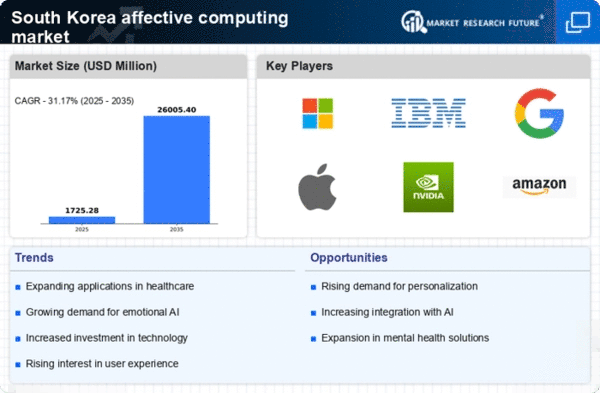Growth of Smart Devices and IoT
The proliferation of smart devices and the Internet of Things (IoT) is significantly influencing the affective computing market in South Korea. This trend allows for the development of applications that can respond to user emotions. As more devices become interconnected, the ability to collect and analyze emotional data in real-time is becoming increasingly feasible. This integration allows for the development of applications that can respond to user emotions, enhancing user experience across various platforms. Market analysts project that the number of connected devices in South Korea will reach over 100 million by 2026, creating vast opportunities for affective computing applications. This growth is likely to drive innovation in areas such as smart home technology, wearables, and mobile applications, thereby expanding the reach and impact of the affective computing market.
Increased Focus on Mental Health Solutions
The growing awareness of mental health issues in South Korea is driving demand for affective computing solutions aimed at improving mental well-being. As society becomes more open to discussing mental health, there is a corresponding need for technologies that can assist in monitoring and managing emotional states. Affective computing tools, such as mood tracking applications and virtual therapy assistants, are gaining traction as effective means to support mental health. Recent surveys indicate that approximately 40% of South Koreans are interested in using technology to help manage their mental health. This rising interest is likely to propel the affective computing market, as more companies develop solutions tailored to address these needs, ultimately contributing to a healthier society.
Advancements in Natural Language Processing
Advancements in natural language processing (NLP) are playing a crucial role in shaping the affective computing market in South Korea. As NLP technologies become more sophisticated, they enable machines to understand and interpret human emotions expressed through language. This capability is particularly valuable in customer service applications, where understanding emotional context can enhance user interactions. The market for NLP in South Korea is expected to grow by over 20% annually, driven by the increasing adoption of chatbots and virtual assistants. These tools are being integrated into various sectors, including retail and finance, to provide more empathetic and responsive customer experiences. Consequently, the advancements in NLP are likely to further stimulate the growth of the affective computing market, as businesses seek to leverage these technologies to improve customer satisfaction.
Integration of Affective Computing in Education
The integration of affective computing technologies in the education sector is emerging as a key driver for the market in South Korea. This trend highlights the importance of emotional intelligence in learning environments. Educational institutions are increasingly recognizing the importance of emotional intelligence in learning environments. By utilizing affective computing tools, educators can assess student emotions and adapt teaching methods accordingly. This approach not only enhances student engagement but also improves learning outcomes. Recent studies indicate that schools implementing these technologies have reported a 30% increase in student participation and satisfaction. As the education sector continues to evolve, the demand for affective computing solutions is expected to rise, further propelling the growth of the affective computing market. This trend highlights the potential for technology to create more responsive and supportive educational experiences.
Rising Demand for Emotion Recognition Technologies
The affective computing market in South Korea is experiencing a notable surge in demand for emotion recognition technologies. This trend is largely driven by the increasing need for businesses to understand consumer emotions and preferences. Companies are investing in solutions that can analyze facial expressions, voice tones, and physiological signals to enhance customer engagement. According to recent estimates, the market for emotion recognition technologies is projected to grow at a CAGR of approximately 25% over the next five years. This growth is indicative of a broader shift towards personalized marketing strategies, where understanding emotional responses can lead to improved customer satisfaction and loyalty. As organizations in South Korea continue to adopt these technologies, the affective computing market is likely to expand significantly, creating new opportunities for innovation and development.
















